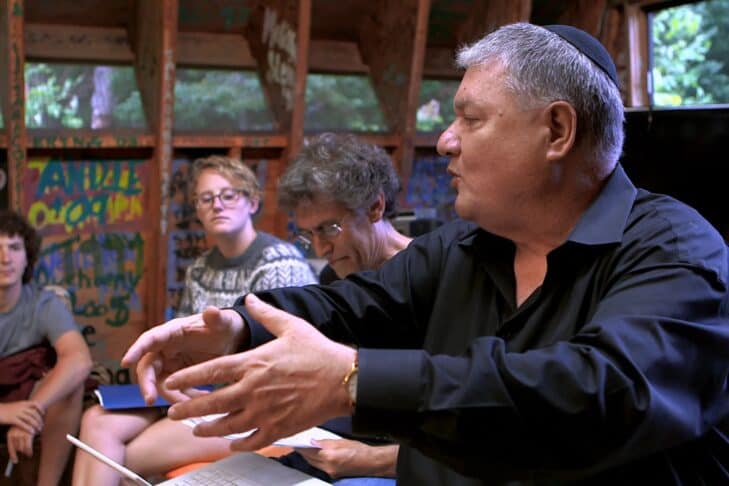Every Friday afternoon, a thousand or more lovers of cantorial artistry make a point to scroll through Facebook to watch a master cantor sing prayers and tell stories about the generation of cantors who taught and influenced him. Cantor Jacob Ben Zion Mendelson, 76, known to the Jewish world as “Jackie,” is not just a cantor. He is a cantor’s cantor. In Yiddish, a chazzn. (Try saying that in one syllable, and you will begin to understand.)
To speak the word chazzn is to travel back in time to a very different world: the period between the two world wars when “cantorial giants walked the earth,” to quote one of Jackie’s favorite lines. And he should know. Jackie grew up at that very time, in that very world. And the epicenter of that world was Borough Park, Brooklyn, specifically a shul (synagogue) named Beth El, whose cantors at the time included some of the most famous names in the pantheon of cantorial history.
- A few decades before young Jackie entered the picture, millions of Eastern European Jews poured into New York in search of a better life. Beyond their meager belongings, they brought to this country a culture that would define theirs and succeeding generations: the Yiddish language, with its literature, press, theater, comedy and music; a culture of food, beloved dishes such as pastrami and knishes, known today as “delicatessen” (deli); and, most important, by a style of synagogue worship whose towering figure was the chazzn.
The story of Jackie’s early career is told in “A Cantor’s Tale” (2005), directed by Erik Anjou. It is a film punctuated by stories and tall tales of Jewish life in Brooklyn, circa 1950, where even the deli man could sing a respectable Shema Koleinu, and fans of one cantor or another would walk home from shul debating the merits, faults and idiosyncrasies of the great chazzanim, whose stardom rivaled the baseball greats of Jackie’s beloved Brooklyn Dodgers.
Young Jackie grew up in that world, a boy soprano in the synagogue choir, where being tapped for a solo was the equivalent of hitting a home run playing stickball with the gang. Jackie’s vocal talents (shared with his older brother, Sol, who also became a cantor) had a lot to do with it, but Jackie was also pushed along by his parents. His father owned a delicatessen and was a prominent member of the shul, while his mother, whose love of chazzanut (cantorial singing) superseded everything else, either gave or withheld the approval young Jackie desperately strived to win.
Beneath the humorous stories of “A Cantor’s Tale” is a darker side, set in motion by Jackie’s mother’s mental illness, Jackie’s own struggle with dyslexia and depression, and his continuing quest to please his parents. Jackie’s road to cantorial glory was not an easy one. It took him years to conquer his demons and establish the vocal technique that would lead to success in the competitive world of chazzoness (accented on the middle syllable), as cantorial singing is called in Yiddish.
Jackie’s hard work brought him as successful a cantorial career as one could hope for, especially during a time of change in the Jewish world, when synagogues increasingly gravitated away from the classic tradition and toward folk and popular music: serving a large Conservative synagogue near New York City, concertizing around the world, lecturing, teaching student cantors, collaborating with jazz and klezmer musicians, even playing himself in popular movies such as “Deli Man” (2014), and starring in a one-man musical, “A Cantor’s Couch.”
Which brings us to the present moment, and the Boston premiere of a new film from the same director, a 2020 sequel titled “A Cantor’s Head.” Where the earlier movie gave us Jackie’s origin story, kvelling in his well-earned success as a cantorial superstar, “A Cantor’s Head” has suddenly flipped the script. In this very intimate film, Jackie has just learned that his synagogue contract will not be renewed. Is it something about him? His voice? His outside activities? Or is he the victim of forces too powerful for any mortal to withstand? This is a film that any lover of Jewish music and culture, or anyone devoted to synagogue life, should see. It is funny, sad and painful, yet, dare I say, hopeful.
The Jewish people is defined by many things, but among the most powerful is our steadfast determination to pass the tradition from one generation to the next. When that chain of tradition is broken, we are forced to reflect on who we are and where we are going. This film, “A Cantor’s Head,” does just that. It allows us a rare look behind the bimah and into the soul of one man who has dedicated his life to only one purpose: to sing glorious music to the heavens, and to bring us along for the ride.
Join Temple Emanuel in Newton for a screening of “A Cantor’s Head” on Saturday, March 9, at 7:30 p.m. After the film, Cantor Elias Rosemberg will be in conversation with the director, Erik Grenberg Anjou.
Never miss the best stories and events! Get JewishBoston This Week.
This post has been contributed by a third party. The opinions, facts and any media content are presented solely by the author, and JewishBoston assumes no responsibility for them. Want to add your voice to the conversation? Publish your own post here.
MORE




